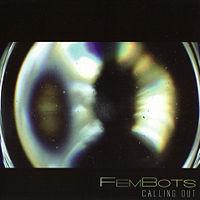There's a truly spectacular class of independent music coming out of Canada, and it's so frustratingly genre agnostic and post-everything that to even bother labeling it is an exercise in futility. Toronto duo FemBots are often lumped into some quasi-fictitious indie-folk genre, and that's an absolutely uncomfortable fit. The duo of Dave MacKinnon and Brian Poirier once toured as members of the Weakerthans and that connection's far more revealing. The groups share an aesthetic if not a worldview. FemBots are more ambitious and experimental than the Winnipeg favourites, more of an ongoing studio project than a traditional band. They're content to toy with melancholy atmospherics and layers of sound, and that probably prevents them from cranking out anthems as effective as Samson and company's. So I'm hesitant to to call FemBots a folk act. The group exude none of the knowingly-clever nouveau hippy smarm of so many freak-folk and jam acts. They're too urban, too working class. Their songs are more about craftsmanship then a lofty ideal.
Calling Out, the band's fourth record, follows trails staked out on 2005's The City. The group continues to hammer away at a signature sound, trading in their weirder tendencies for poignancy. That makes this less instantly gratifying than the vintage romanticism of their early work, but their weary yet grounded outlook has a better shelf life. This time out the duo's tapped Paul Aucoin of the Hylozoists for horns and vibraphone, with Nathan Lawr again helping out on percussion. "Good Days" starts the record on a darker note, taking a fairly pessimistic look at religiosity that becomes something of a running theme. "My Hands Are a City" is the album's true single and its most satisfying bit of pop songwriting. The nostalgic march of "Jl Recalls His Amazon Adventure from a Comfortable Chair in the Window of No. 5 the Kingsway" gives the Weakerthans some competition on the retired Victorian explorer market. "Get in the Van" dwells on the grind of touring life, doubtlessly accentuated by the vastness that comes with Canadian geography. The title isn't spoken until the final line, but it's treated as less an anthem and more of a sinister addiction. The later half of the record finds more straightforward rock than the prior, notably the cacophonous racket that ends "Lost at Sea" and the urgent rhythm of "Hand Prints in Wet Cement." There's a mix of mundane and epic on the album's final pair of tracks. "End of the Day" is literally about riding the bus while "Ship Breaking" is a rather timeless piece on shipwrecks that climaxes in what I can only discern is honest-to-goodness Morse code.
It's worth noting that this album was born of a failed experiment. Calling Out was to be recorded with Iner Souster's custom instruments, built from junk, but the results weren't reliable enough for the doubtlessly meticulous duo. The customs were relegated to the rhythm section, and the record itself sounds surprisingly conventional given those origins. Tracks like "Lost at Sea" are quite heavily orchestrated, building to a crescendo of guitar distortion and electronic flourishes, and it's hard to imagine that played on pots and pans. "Junkstraments," even the attempted use thereof, implies a looseness that the album doesn't convey in the least.
Calling Out is, if nothing else, a carefully and lovingly crafted batch of songs. It's no surprise that an entire studio's grown around the FemBots in Toronto, as the group takes the art of record making fairly seriously. The results are, once again, second to none.
